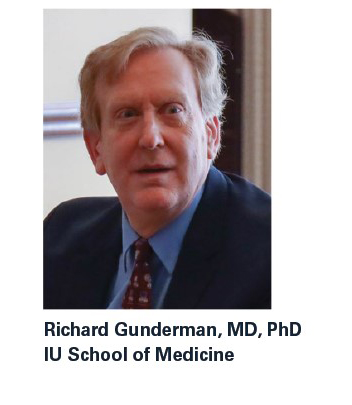By: Richard Gunderman, MD, PhD
IU School of Medicine

It is difficult to think of a Hoosier physician who contributed more in more areas throughout his career and life than John Shaw Billings. When some physicians feel overwhelmed by contemporary healthcare, it is good to be reminded that our forebears have managed to surmount even greater obstacles, calling to mind the qualities of character that enabled them to do so.
Billings was born in Allenville in southeastern Indiana in 1838, the son of a postmaster and a mother who loved reading and the classics. He enrolled at Miami University in Ohio at age 14, then, after graduation, at what is now the University of Cincinnati College of Medicine. He received his medical degree in 1860, the year Abraham Lincoln was elected president.
Billings served in the Union forces during the Civil War. At Gettysburg, he worked almost around the clock as a surgeon near Little Round Top, writing to his wife, “I am covered with blood and tired out almost completely.” He followed up with another letter that read, “The orderly has just scrubbed all the blood out of my hair with soap and bay rum, and my scalp feels as though a steam plow passed through it.”
After the war, Billings published a six-volume account of medical and surgical history. He also set to work enhancing the army’s library, relocating it to Ford’s Theater, the site of Lincoln’s assassination. There, he built a collection that included more than 50,000 volumes, establishing the policy that its holdings should be available to physicians all over the country.
Realizing that the growth of medical literature was making it nearly impossible to search, Billings created the Index Medicus, which eventually morphed into MEDLINE and now PubMed. The great pathologist William Welch labeled this the single most important American contribution to medical knowledge, exceeding even anesthesia and insect transmission of disease.
Billings also lobbied successfully to have health data collected as part of the 10th, 11th, and 12th U.S. censuses, further ensuring that the vital data was published. As part of this effort, he suggested that punch cards could be used in tabulating data, an innovation that eventually led to the founding of the International Business Machines Corp. (IBM).
Billings played a central role in the founding of Johns Hopkins Hospital, designing the original buildings and helping to recruit the initial faculty of the medical school, including William Osler. He believed that students should be trained not only as practitioners but as investigators, who would both apply existing knowledge and help to advance medical understanding.
In 1895, Billings became the founding director of the New York Public Library, a role in which he served until he died in 1913. He designed the building and opened it in 1911 with a collection of over one million books. He also persuaded industrialist Andrew Carnegie to fund an additional 65 branch libraries around the city, as well as 2,500 libraries around the country. The state with the most was Indiana.
A physically imposing presence, Billings was a man who knew how to make a difference. One biographer wrote, “Everything to be done, every public duty or private obligation, was duly pigeon-holed in his mind, and all promises were faithfully kept and easily performed…. He came to be looked up to and sought after everywhere as that rare thing in modern life, an absolutely reliable man.”
How did Billings do it all? He aspired to be useful, and he went through life with a deep sense of calling to make a difference. Yet he did not undertake obligations that he could not fulfill. When he did assume responsibility for a task, he started on it as soon as possible, and he kept at it until it was done. These qualities made him a human dynamo and earned the admiration of all who knew him.
Above all, he possessed practical wisdom. He could see more clearly than most what needed to be done. When the needs exceeded his own knowledge and ability, he reached out to others, often awakening in them capabilities of which they had been unaware. He expected so much of himself that he inspired in others the desire to serve and excel.
Offering a eulogy to Billings, Welch wrote, “Of all the men I have ever known, he was about the wisest. He was a man whose judgment you sought on any subject, and you pinned your faith to him more than to any man of your acquaintance. He was wisest because he was under no illusions. He got at the heart and essence of things.”
To “get at the heart and essence of things”: few abilities are more needed in contemporary medicine. There are many demands on our time and energy. As we navigate our way through each day, it is vital that we, like Billings, cull the chaff from the kernel, avoiding the temptation to become ensnared in countless little things and instead remain focused on the few higher things that matter most.
Richard Gunderman, MD, PhD, is the chair of the ISMA Wellness Steering Committee.